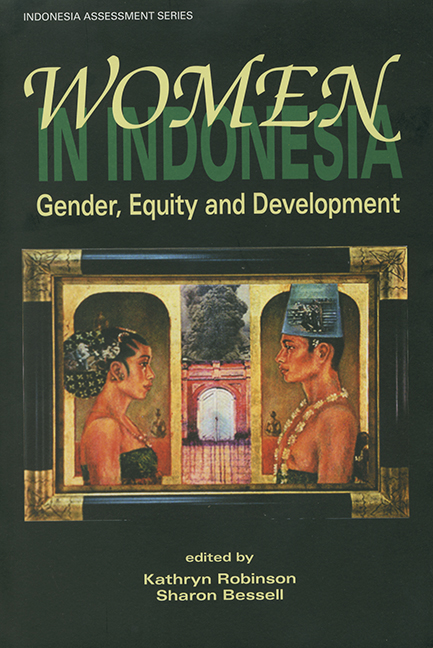Book contents
- Frontmatter
- Contents
- Tables
- Figures
- Contributors
- Acknowledgments
- Glossary
- Prologue
- 1 Introduction to the Issues
- 2 The Mega Factor in Indonesian Politics: A New President or a New Kind of Presidency?
- 3 The Downfall of President Abdurrahman Wahid: A Return to Authoritarianism?
- 4 The Year in Review: From Blind Man's Bluff to Mega Expectations
- 5 Further Comments on the Economy, with a Gender Perspective
- 6 Institution Building: An Effort to Improve Indonesian Women's Role and Status
- Commentary
- 7 Feminism in Indonesia in an International Context
- 8 Gay and Lesbi Subjectivities, National Belonging and the New Indonesia
- 9 And the Winner Is … Indonesian Women in Public Life
- 10 Indonesian Women Artists: Transcending Compliance
- 11 Literature, Mythology and Regime Change: Some Observations on Recent Indonesian Women's Writing
- 12 Women and the Labour Market during and after the Crisis
- 13 Women's International Labour Migration
- 14 Customary Institutions, Syariah Law and the Marginalisation of Indonesian Women
- 15 Women's Grassroots Movements in Indonesia: A Case Study of the PKK and Islamic Women's Organisations
- 16 Women's Activism against Violence in South Sulawesi
- 17 Gender Mainstreaming and Sex-disaggregated Data
- 18 The Changing Indonesian Household
- 19 Women, Family Planning and Decentralisation: New Variations on Old Themes
- 20 Men, Women and Community Development in East Nusa Tenggara
- References
- Index
- INDONESIA ASSESSMENT SERIES
6 - Institution Building: An Effort to Improve Indonesian Women's Role and Status
Published online by Cambridge University Press: 21 October 2015
- Frontmatter
- Contents
- Tables
- Figures
- Contributors
- Acknowledgments
- Glossary
- Prologue
- 1 Introduction to the Issues
- 2 The Mega Factor in Indonesian Politics: A New President or a New Kind of Presidency?
- 3 The Downfall of President Abdurrahman Wahid: A Return to Authoritarianism?
- 4 The Year in Review: From Blind Man's Bluff to Mega Expectations
- 5 Further Comments on the Economy, with a Gender Perspective
- 6 Institution Building: An Effort to Improve Indonesian Women's Role and Status
- Commentary
- 7 Feminism in Indonesia in an International Context
- 8 Gay and Lesbi Subjectivities, National Belonging and the New Indonesia
- 9 And the Winner Is … Indonesian Women in Public Life
- 10 Indonesian Women Artists: Transcending Compliance
- 11 Literature, Mythology and Regime Change: Some Observations on Recent Indonesian Women's Writing
- 12 Women and the Labour Market during and after the Crisis
- 13 Women's International Labour Migration
- 14 Customary Institutions, Syariah Law and the Marginalisation of Indonesian Women
- 15 Women's Grassroots Movements in Indonesia: A Case Study of the PKK and Islamic Women's Organisations
- 16 Women's Activism against Violence in South Sulawesi
- 17 Gender Mainstreaming and Sex-disaggregated Data
- 18 The Changing Indonesian Household
- 19 Women, Family Planning and Decentralisation: New Variations on Old Themes
- 20 Men, Women and Community Development in East Nusa Tenggara
- References
- Index
- INDONESIA ASSESSMENT SERIES
Summary
Efforts to improve women's role and status in Indonesia began long ago. In each period of history – colonial, post-independence, New Order and post-New Order – the women's movement has revealed its own dynamism, whether the initiative has come from the people or from the government. The movement started from a spirit of struggle – against polygamy, and for the education of women. Since 1999, when the era of transition to democracy began, the motivation has changed to empowering women to achieve gender equity and equality. This goal reflects the emphasis in today's Indonesia on strengthening civil society by enabling people to manage their own affairs.
THE SITUATION BEFORE INDEPENDENCE
Throughout its history Indonesia has had women leaders who were famous for their wisdom and tough queens who ruled over their kingdoms for extended periods, including Tri Buana Tungga Dewi. In the 19th century a few well-known women participated actively in the fight against colonialism, among them Cut Nyak Dien, Cut Mutiah, Marta Christina Tiyahahu and Nyi Ageng Serang.
During the colonial era, the struggle to improve the condition of women focused on the provision of education for women, which was felt to be a prerequisite for national liberation. The other main issues uniting women activists of the time were their opposition to polygamy, and to restrictions on women's activities in the public domain.
As the number of women supporting the endeavour to improve women's role and status grew, their efforts were institutionalised in the first women's organisation, Poetri Mardika. Established in 1912, Poetri Mardika was supported by the first independence organisation for men, Budi Oetomo. The fight by the earlyfeminist, Kartini, against feudalism and colonialism (the source of much suffering for Indonesian women) inspired the creation of more women's organisations, many of them based on religion, ethnicity or region.
In the spirit of national integration, a more broad-based umbrella organisation of 20 women's groups was established at the first National Women's Congress, which was held on 22–26 December 1928. The congress attracted the participation of 31 women's organisations from all regions of Indonesia, and passed an important resolution calling for improvements to women's access to education and the provision of better information at the time of marriage on women's divorce rights.
- Type
- Chapter
- Information
- Women in IndonesiaGender, Equity and Development, pp. 68 - 77Publisher: ISEAS–Yusof Ishak InstitutePrint publication year: 2002



